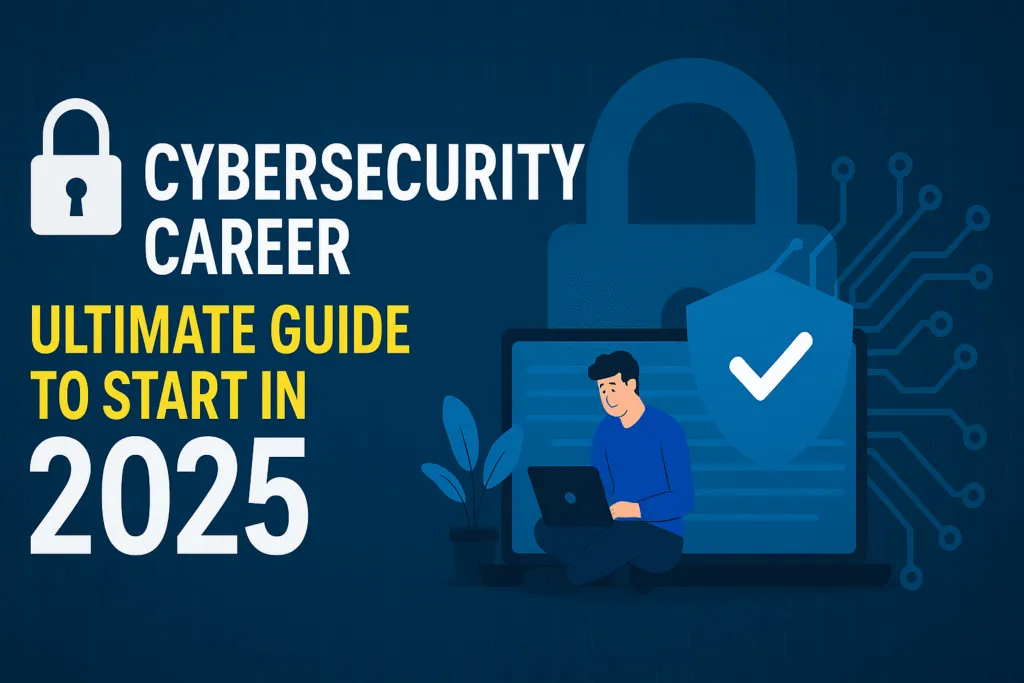Introduction – Why Choose Cybersecurity as a Career?
Cybersecurity is one of the fastest-growing and most in-demand fields in the tech industry today. As our dependence on digital platforms increases, so does the need to protect them from cyber threats. From financial data to national security, everything now depends on how well we can defend our digital world. This makes cybersecurity not just a job, but a mission-critical career choice.
One of the biggest reasons to pursue a career in cybersecurity is job security. Companies of all sizes are hiring cybersecurity professionals to protect their networks, and the demand continues to outpace the supply. This means plenty of opportunities, high salaries, and strong career growth. Whether you’re just starting out or switching careers, it’s a field that welcomes curious minds and continuous learners.
Another reason to consider cybersecurity is the variety it offers. You can work in ethical hacking, network security, incident response, cloud security, or even cybersecurity law. No two days are the same, and the constant evolution of threats keeps things challenging and engaging.
If you’re someone who enjoys solving puzzles, staying ahead of attackers, and making a real impact, cybersecurity could be the perfect fit. It’s not just about coding—it’s about critical thinking, creativity, and a passion for protecting what matters. With the right skills and mindset, starting a career in cybersecurity today can lead you to a future full of purpose and potential.
What Does a Cybersecurity Professional Do?
A cybersecurity professional plays a critical role in protecting digital systems, networks, and data from unauthorized access, attacks, and breaches. In simple terms, they are the digital guardians of the modern world. Their main goal is to ensure that information remains confidential, secure, and available only to authorized users.
Day-to-day responsibilities can vary based on the role and industry, but most cybersecurity experts focus on identifying vulnerabilities, monitoring systems for suspicious activity, and responding to security incidents. For example, a network security analyst might review firewall settings and network traffic, while a penetration tester actively tries to break into systems to find weaknesses before hackers do.
Cybersecurity professionals also set up and maintain security protocols, perform risk assessments, and implement encryption methods to keep data safe. They may train staff on security best practices and create response plans for potential cyber threats like phishing, ransomware, or data leaks.
With the increasing use of cloud computing, mobile devices, and remote work, the role of cybersecurity has expanded beyond just protecting internal networks. Professionals now need to secure cloud services, mobile apps, and user endpoints, making the job more dynamic and challenging than ever.
In short, a career in cybersecurity offers the opportunity to solve real-world problems, fight cybercrime, and protect critical assets. Whether working for a startup or a government agency, cybersecurity professionals are the first line of defense in an increasingly connected world.
Is Cybersecurity Right for You? Skills and Personality Fit
Cybersecurity isn’t just about computers and codes—it’s about mindset, curiosity, and problem-solving. If you’re wondering whether cybersecurity is right for you, it’s important to look beyond technical skills and consider your personality, interests, and how you approach challenges.
People who thrive in cybersecurity often have a natural curiosity. They love understanding how things work and, more importantly, how things break. If you enjoy puzzles, decoding patterns, or thinking like a hacker, this field might suit you perfectly. Cybersecurity demands strong analytical thinking and attention to detail. One missed alert or overlooked flaw can lead to a major breach, so being meticulous matters.
You don’t need to be a genius in programming to start. While coding helps, many roles focus on policy, strategy, analysis, or compliance. What’s more crucial is a willingness to learn and adapt. Cybersecurity threats evolve constantly, so professionals in this space must enjoy lifelong learning and staying updated with the latest tools and techniques.
Soft skills are equally important. Communication, teamwork, and decision-making play a big role—especially when handling real-time incidents or explaining risks to non-technical stakeholders. A calm, focused attitude under pressure can make all the difference during a cyberattack.
So, is cybersecurity right for you? If you’re passionate about tech, enjoy learning, and have a problem-solving mindset, you’re already on the right path. Combine that with patience, curiosity, and a strong sense of responsibility, and you’ve got the perfect foundation for a successful cybersecurity career.
Cybersecurity Career Paths You Can Choose
One of the most exciting things about cybersecurity is the wide range of career paths it offers. Whether you’re technical, analytical, or even interested in policy, there’s a role that fits your strengths and interests. Cybersecurity is not a one-size-fits-all field—you can choose a path that aligns with your passion and grow from there.
If you enjoy thinking like a hacker, ethical hacking or penetration testing could be a great fit. These professionals simulate attacks to find vulnerabilities before real hackers do. For those who love problem-solving and investigating digital evidence, a career in digital forensics or incident response offers an exciting challenge.
Network security specialists focus on protecting the flow of information through networks, setting up firewalls, and detecting intrusions. On the other hand, if you’re more interested in building secure systems, roles like cybersecurity engineer or architect let you design the defense systems from the ground up.
For people with a strategic mindset, governance, risk, and compliance (GRC) roles involve setting policies, performing audits, and ensuring that organizations follow security regulations. Cybersecurity analysts monitor systems, respond to threats, and often act as the first line of defense.
With the rise of cloud services, cloud security has also become a fast-growing specialization. Similarly, application security experts ensure that software is developed and maintained securely.
Whether you’re starting fresh or switching from another IT field, the cybersecurity landscape has plenty of room for growth. Each role plays a key part in keeping our digital world safe, and the best part—you can always shift paths as you grow. A career in cybersecurity is flexible, rewarding, and full of future potential.
Educational Background: What to Study for Cybersecurity
Getting started in cybersecurity doesn’t always require a specific degree, but having the right educational foundation can give you a strong head start. Many professionals begin with a background in computer science, information technology, or electronics. These subjects teach core concepts like networking, operating systems, programming, and system architecture—all essential in understanding how digital systems function and how to protect them.
A bachelor’s degree in cybersecurity, computer science, or information security is a great option if you’re starting your academic journey. These programs usually cover key areas such as cryptography, ethical hacking, digital forensics, and security policies. For those already holding a degree in another field, certifications and self-paced online courses can bridge the knowledge gap effectively.
Learning programming languages like Python, C, or JavaScript is also helpful, especially for roles involving automation, scripting, or vulnerability assessment. Similarly, understanding how networks operate—TCP/IP, DNS, firewalls, and protocols—is crucial for defending against network-based attacks.
In addition to technical knowledge, studying cybersecurity frameworks like NIST, ISO 27001, and security standards helps you understand how real-world companies manage risk. Courses in risk management, data privacy, and compliance can be valuable, particularly if you’re aiming for roles in policy or governance.
The good news is that cybersecurity is a field where passion and self-initiative matter as much as formal education. Many successful professionals are self-taught or have come from unrelated backgrounds. Whether through a degree, diploma, or online learning, the goal is to build a strong base and keep upgrading your skills to match the ever-evolving threat landscape. Cybersecurity rewards those who are eager to learn, explore, and grow continuously.
Top Certifications to Kickstart Your Cybersecurity Career
Certifications play a crucial role in launching a career in cybersecurity, especially if you’re new to the field or switching from another domain. They not only validate your skills but also show employers that you’re serious about learning industry-standard practices. With so many options available, it’s important to choose certifications that match your current knowledge level and career goals.
For absolute beginners, CompTIA Security+ is often the best place to start. It covers foundational topics like threats, attacks, cryptography, and risk management. It’s recognized globally and is a solid stepping stone into entry-level cybersecurity roles.
If you already have some IT experience, consider Certified Ethical Hacker (CEH). It focuses on penetration testing and ethical hacking, teaching you how to think like an attacker to better defend systems. It’s hands-on and highly respected in the industry.
Another valuable option is Cisco Certified CyberOps Associate, especially if you’re interested in security operations or working in a Security Operations Center (SOC). It provides a good understanding of how cyber threats are detected and responded to in real-time environments.
For those leaning toward governance, compliance, or risk management, Certified Information Systems Auditor (CISA) or Certified Information Security Manager (CISM) are ideal. These certifications are great for non-technical professionals who want to focus on policy, audits, and security leadership.
Finally, the Certified Information Systems Security Professional (CISSP) is a gold-standard certification for advanced professionals. It requires experience, but it’s highly respected and often leads to high-level roles.
Choosing the right cybersecurity certification depends on your career path, but starting with an entry-level credential like Security+ and gradually advancing can open doors to a rewarding future in the cybersecurity industry.
Self-Learning Resources: Free Courses, Blogs & Labs
Starting a career in cybersecurity doesn’t have to be expensive. There are plenty of high-quality free resources available online that can help you build skills, stay updated, and practice hands-on—all from the comfort of your home. Whether you’re a complete beginner or already in tech, self-learning is a powerful way to grow in cybersecurity.
Free courses are a great starting point. Platforms like Cybrary, edX, and Coursera offer beginner-friendly cybersecurity courses covering everything from basic networking to ethical hacking. Google’s Cybersecurity Certificate and IBM’s Cybersecurity Analyst course on Coursera are also excellent for gaining industry-aligned knowledge at no cost.
When it comes to staying current with the latest trends, threats, and tools, reading top cybersecurity blogs is a must. Follow sites like Krebs on Security, The Hacker News, Bleeping Computer, and Dark Reading to keep up with real-world cyber incidents and expert analysis. These blogs often break news faster than textbooks and offer practical insights you won’t find in traditional courses.
Hands-on practice is what really sets cybersecurity apart. Use free labs like TryHackMe, Hack The Box, and OverTheWire to test your skills in real-world scenarios. These platforms simulate actual cyber environments, letting you practice penetration testing, vulnerability scanning, and network defense in a safe, legal way.
YouTube channels like NetworkChuck, John Hammond, and Professor Messer also provide valuable tutorials and walkthroughs. The more you explore, the more you’ll learn—and all without spending a single rupee.
With the right free tools, dedication, and curiosity, you can start building a strong cybersecurity foundation today. The internet is full of resources—you just need to pick your path and dive in.
Building Hands-On Skills with Projects and Simulations
In cybersecurity, theoretical knowledge isn’t enough—you need real-world, hands-on experience to truly stand out. Hiring managers look for candidates who can demonstrate practical skills, and the best way to build those is through personal projects and simulated environments. The good news is that even without a job or degree, you can create your own learning lab and gain valuable experience.
Start with basic networking and system setups. Build a home lab using virtual machines through tools like VirtualBox or VMware. Install Linux distributions such as Kali Linux or Parrot OS and practice common tasks like port scanning, user enumeration, and privilege escalation. These exercises help you understand how systems behave and where vulnerabilities can exist.
You can also take part in Capture the Flag (CTF) competitions. Platforms like TryHackMe, Hack The Box, and PicoCTF offer interactive, gamified labs where you solve real-world cybersecurity challenges. They cover everything from beginner topics like file permissions and basic scripting to advanced reverse engineering and web exploitation.
Another great project idea is creating a simple honeypot—a fake system designed to attract attackers. It teaches you how hackers operate and how logs can be analyzed for threat patterns. You can also simulate phishing attacks in a test environment to understand how social engineering works and how to defend against it.
Document everything you do. Write blog posts, record walkthroughs, or build a portfolio site showcasing your cybersecurity projects. This not only reinforces your learning but also makes you more visible to recruiters.
Hands-on learning is the bridge between theory and real-world application in cybersecurity. The more you break, fix, and explore, the stronger your skills become—and the more confident you’ll be when facing real threats in the field.
How to Gain Experience: Internships, Volunteering, and Bug Bounties
Breaking into cybersecurity without prior experience can feel tough, but there are several smart ways to build credibility and hands-on exposure even before landing your first full-time job. Internships, volunteering, and bug bounty programs are three powerful paths that help you gain real-world experience, grow your skills, and build your cybersecurity portfolio.
Internships are one of the most effective ways to get started. Whether it’s a short-term summer program or a remote internship, working under experienced professionals gives you practical knowledge of tools, techniques, and workflows used in the industry. Keep an eye on LinkedIn, company career pages, and platforms like Internshala or AngelList to find cybersecurity internships that match your skill level.
Volunteering is another underrated yet impactful way to build experience. Offer your cybersecurity skills to non-profits, small businesses, or educational institutions. You could help them set up basic security systems, conduct awareness training, or even audit their websites for vulnerabilities. These real-world projects not only sharpen your skills but also show initiative and responsibility—qualities employers value.
Bug bounty platforms like HackerOne, Bugcrowd, and Synack let you legally hack into websites and apps to find and report security flaws. In return, you earn rewards, recognition, and most importantly, hands-on experience. Even if you’re a beginner, starting with small, low-risk programs can help you build confidence and gradually tackle more complex challenges.
Combining these three approaches gives you a strong edge. You gain experience, build a professional network, and create a track record that speaks louder than just certifications. In cybersecurity, what you can do matters more than just what you know—and these paths help prove it.
Creating a Strong Cybersecurity Resume and LinkedIn Profile
A well-crafted resume and LinkedIn profile can open doors in cybersecurity, especially when you’re just starting out. Recruiters often scan dozens of profiles daily, so standing out means showcasing your skills, passion, and practical experience clearly and professionally. Even without years of work history, a smart presentation can make a strong impression.
Start your cybersecurity resume with a short summary that highlights your goals, certifications, and areas of interest. Focus on what you can bring to the table—like hands-on lab experience, personal projects, or relevant coursework. Tailor your resume to each job description by using keywords like network security, penetration testing, vulnerability scanning, or incident response. This not only helps with human readers but also with applicant tracking systems (ATS).
Under your experience section, include internships, freelance work, bug bounty reports, or any voluntary cybersecurity tasks you’ve done. If you’ve participated in CTFs, completed labs on platforms like TryHackMe or Hack The Box, or built home labs, mention them clearly. Highlight specific tools you’ve used, like Wireshark, Metasploit, or Burp Suite.
For your LinkedIn profile, use a professional photo and write a headline that reflects your cybersecurity interests, like “Aspiring Cybersecurity Analyst | Ethical Hacking Enthusiast | CompTIA Security+ Certified.” The ‘About’ section should tell your story—what motivated you to choose cybersecurity, what you’ve learned so far, and what you’re aiming for next.
Regularly share or comment on cybersecurity articles, projects, and certifications to show that you’re engaged in the community. Connect with professionals, join cybersecurity groups, and ask for endorsements on your skills.
Both your resume and LinkedIn should reflect more than just your qualifications—they should show your passion, initiative, and continuous learning. That’s what makes you memorable in a competitive cybersecurity job market.
Where to Find Entry-Level Cybersecurity Jobs
Finding your first cybersecurity job can be challenging, but knowing where to look makes a big difference. Today, many companies are actively hiring entry-level cybersecurity professionals—even if you don’t have years of experience. The key is to target the right platforms, build a solid foundation, and stay persistent.
Start with popular job portals like LinkedIn, Indeed, Naukri, and Glassdoor. Use filters to search for keywords like “Cybersecurity Analyst,” “Security Operations Center (SOC) Analyst,” “Information Security Intern,” or “Entry-Level Cybersecurity.” These platforms also let you set alerts so you’re notified as soon as new openings are posted.
Look into government and defense organizations, which often have cybersecurity roles under initiatives like CERT-IN or under Digital India missions. These can be great places to learn while working on impactful projects.
Startups and small IT firms may not advertise as widely but often need security help. Reach out directly via email or LinkedIn, and offer your assistance. Many companies are open to hiring beginners who show passion, basic skills, and a willingness to learn.
Internship platforms like Internshala, LetsIntern, and AngelList also list cybersecurity internships that can convert into full-time jobs. Even freelance platforms like Upwork and Freelancer occasionally list security tasks like malware removal, website audits, or security consultation.
Don’t forget about job boards dedicated to cybersecurity such as CyberSecJobs.com, ClearedJobs.Net, and HackerOne Careers. These often feature global opportunities, including remote roles.
Networking is equally important. Join cybersecurity forums, Discord groups, and attend online webinars or local meetups. A personal connection or a referral can often land you a job faster than any online application.
With consistent effort, the right learning mindset, and active engagement in the community, you’ll find that entry-level cybersecurity jobs are more accessible than they seem.
Tips to Crack Your First Cybersecurity Interview
Landing your first cybersecurity interview is a big milestone—but cracking it requires more than just technical knowledge. Employers want to see if you understand the basics, can think critically under pressure, and have the right attitude to grow in the field. With the right preparation and mindset, you can turn that opportunity into your first job.
Start by reviewing core concepts. Be clear on networking fundamentals (IP, DNS, firewalls, protocols), types of cyberattacks (phishing, malware, DDoS), and basic security tools like Wireshark, Nmap, and Burp Suite. If you claim to know a tool or concept on your resume, be ready to explain how you’ve used it practically—even in labs or personal projects.
Many interviewers ask scenario-based questions to test your problem-solving approach. For example, “How would you respond to a ransomware attack?” or “What steps would you take if you noticed unusual login activity?” Practice answering these questions in a structured way—identify the problem, outline your thought process, and suggest logical actions.
Don’t ignore the behavioral part. Expect questions like “Why do you want to work in cybersecurity?” or “Tell us about a time you solved a difficult technical problem.” Be honest and focus on examples that highlight your curiosity, perseverance, and learning attitude.
If you’ve done projects, labs, or participated in CTFs, talk about them. Share what challenges you faced, what you learned, and how it improved your skills. It shows initiative and real-world exposure, which beginners often lack.
Lastly, ask smart questions at the end—about the team’s tools, workflows, or what they expect from someone in your role. This shows interest and professionalism.
Preparation, confidence, and a genuine passion for cybersecurity can set you apart—even if it’s your first interview.
Building a Career Roadmap: From Beginner to Expert
A successful career in cybersecurity doesn’t happen overnight—it’s a journey that requires planning, learning, and adapting. Whether you’re just stepping in or already have basic knowledge, creating a clear roadmap helps you move from beginner to expert with purpose and confidence.
Start by mastering the fundamentals. Focus on understanding computer networks, operating systems, and how the internet works. Learn about different types of cyber threats, encryption, and basic security principles. Use free platforms like TryHackMe, Cybrary, and Coursera to get started, and build your own home lab for hands-on practice.
Once you’re comfortable with the basics, pursue entry-level certifications like CompTIA Security+ or Cisco CyberOps Associate. These validate your skills and make you eligible for roles like SOC analyst or junior security analyst. At this stage, aim to get real-world experience through internships, freelance work, or volunteering for small projects.
As you gain experience, specialize based on your interests. You might choose ethical hacking, incident response, cloud security, or risk management. Earn intermediate certifications like CEH, OSCP, or CISM depending on your focus. Contribute to open-source projects, participate in Capture the Flag (CTF) challenges, and stay active in cybersecurity communities.
To reach the expert level, you’ll need deep technical expertise and a strategic mindset. Roles like cybersecurity architect, red team lead, or information security manager often require 5–10 years of experience along with certifications like CISSP or CCSP. Focus on leadership, mentoring, and understanding business-level security planning.
Throughout your journey, keep learning. Follow blogs, attend webinars, and stay updated on emerging threats. Cybersecurity is always evolving, and so should you.
Your growth from beginner to expert is a continuous process. With consistency, passion, and smart planning, the cybersecurity career path offers endless opportunities for advancement and impact.
Top Mistakes to Avoid When Starting in Cybersecurity
Starting a career in cybersecurity can be exciting, but many beginners unknowingly make mistakes that slow their progress. Being aware of these early on can help you stay focused, save time, and build a stronger foundation for long-term success.
One of the biggest mistakes is chasing certifications without building practical skills. While certifications like Security+ or CEH can boost your resume, they won’t mean much if you can’t apply what you’ve learned. Make sure you balance your study time with hands-on practice using platforms like TryHackMe, Hack The Box, or a personal lab setup.
Another common error is trying to learn everything at once. Cybersecurity is a vast field—network security, ethical hacking, cloud security, GRC, and more. Jumping into too many areas too soon can leave you overwhelmed. Instead, start with the basics and slowly explore specific domains that interest you.
Many beginners also ignore the importance of networking. Staying isolated limits your growth. Join cybersecurity forums, LinkedIn groups, Discord channels, and attend local meetups or webinars. Engaging with the community can help you learn faster, get feedback, and discover job opportunities.
Underestimating soft skills is another mistake. Communication, problem-solving, and teamwork are crucial, especially when you need to explain technical issues to non-technical stakeholders or work in a response team. Don’t focus only on technical tools—develop your overall professional abilities too.
Lastly, waiting for the “perfect” moment or job can hold you back. Take internships, freelance gigs, or volunteer work to build experience. Every small project adds value and brings you closer to your goals.
Avoiding these beginner mistakes allows you to grow faster, gain real confidence, and stay ahead in your cybersecurity journey. Learn continuously, stay curious, and take small, consistent steps toward mastery.
Future Trends in Cybersecurity and Career Growth Opportunities
Cybersecurity is evolving faster than ever, and staying ahead of the curve means understanding where the industry is heading. As digital transformation accelerates, new threats and technologies are shaping the future of cybersecurity—and with them, exciting career growth opportunities.
One major trend is the rapid adoption of AI and machine learning in security. Organizations are using AI to detect unusual behavior, automate threat responses, and analyze massive volumes of data in real time. This shift is creating demand for professionals who understand both cybersecurity and data science, opening new hybrid roles like AI security analysts and threat intelligence engineers.
Cloud security is another booming area. As businesses migrate to cloud platforms like AWS, Azure, and Google Cloud, securing cloud environments has become a top priority. Careers in cloud security architecture and DevSecOps are growing fast, with a strong need for experts who can design secure, scalable systems in the cloud.
Zero Trust Architecture is reshaping how companies defend their networks. This “never trust, always verify” model is replacing traditional perimeter-based security. Professionals who understand identity management, endpoint protection, and secure access will be in high demand as Zero Trust becomes the new standard.
The rise of remote work has also expanded the threat landscape. Companies now need cybersecurity experts who can protect remote devices, enforce secure access, and respond to distributed threats across multiple locations.
Looking ahead, cybersecurity law, policy, and compliance will offer non-technical career paths as global regulations around data protection tighten. There’s room for growth not just for engineers and analysts, but also for strategists, auditors, and legal consultants.
In short, the future of cybersecurity is full of opportunities. By staying updated on trends and continuing to learn, you can position yourself at the forefront of this high-growth, high-impact industry.
Conclusion – Your First Step Toward a Secure Future
Starting a career in cybersecurity may seem overwhelming at first, but with the right mindset, resources, and persistence, it’s a journey well worth taking. The field is not only growing rapidly but also evolving in exciting ways, offering endless opportunities for those ready to learn and adapt.
Whether you’re coming from a technical background or switching careers entirely, your path in cybersecurity can be shaped by curiosity, consistent effort, and practical learning. From foundational knowledge and certifications to hands-on labs, real-world projects, and community involvement, every step you take builds toward a strong, impactful career.
The world needs more cybersecurity professionals—people who are ready to protect digital assets, outsmart attackers, and help create safer systems. The demand is real, the roles are diverse, and the growth potential is massive. But it all begins with a single step: choosing to start.
Don’t wait for the perfect moment or the perfect skills. Begin now—explore resources, try simulations, build projects, and connect with the cybersecurity community. Your first role may be just around the corner, and with each effort, you’ll move closer to becoming a trusted defender in the digital world.
Cybersecurity isn’t just a job—it’s a mission. And your secure future begins today.
Also Read: Python vs JavaScript 2025 – Best Language for Beginners
Frequently Asked Questions About Starting a Career in Cybersecurity
Q1. Do I need a degree to start a career in cybersecurity?
No, a degree is not mandatory to begin a career in cybersecurity. Many professionals start through certifications, online courses, and hands-on practice. What really matters is your skills, curiosity, and ability to solve problems in real-world scenarios.
Q2. Which programming languages are useful in cybersecurity?
Python is one of the most popular languages in cybersecurity due to its flexibility and ease of use. Other helpful languages include Bash for scripting, JavaScript for web security, and C or C++ for understanding low-level exploits.
Q3. How long does it take to become job-ready in cybersecurity?
It depends on your background and how much time you dedicate. With focused learning and hands-on practice, many people become job-ready for entry-level cybersecurity roles within 6 to 12 months.
Q4. What are the best free platforms to learn cybersecurity?
TryHackMe, Hack The Box, Cybrary, and OverTheWire are excellent free platforms for learning and practicing cybersecurity skills. YouTube channels like NetworkChuck and John Hammond also offer great beginner content.
Q5. Can I get a job in cybersecurity without experience?
Yes, you can. Start with internships, freelance projects, bug bounties, or even volunteering. Show your skills through personal projects, a strong LinkedIn profile, and certifications to prove you’re job-ready.
Q6. Which certification should I do first for cybersecurity?
CompTIA Security+ is a great starting point. It covers essential concepts and is well-recognized globally. As you progress, you can explore CEH, OSCP, or cloud security certifications based on your interest.
Q7. Is cybersecurity a good long-term career?
Absolutely. With increasing cyber threats and growing digital adoption, cybersecurity offers excellent job security, high salaries, and continuous learning opportunities across many industries worldwide.


















